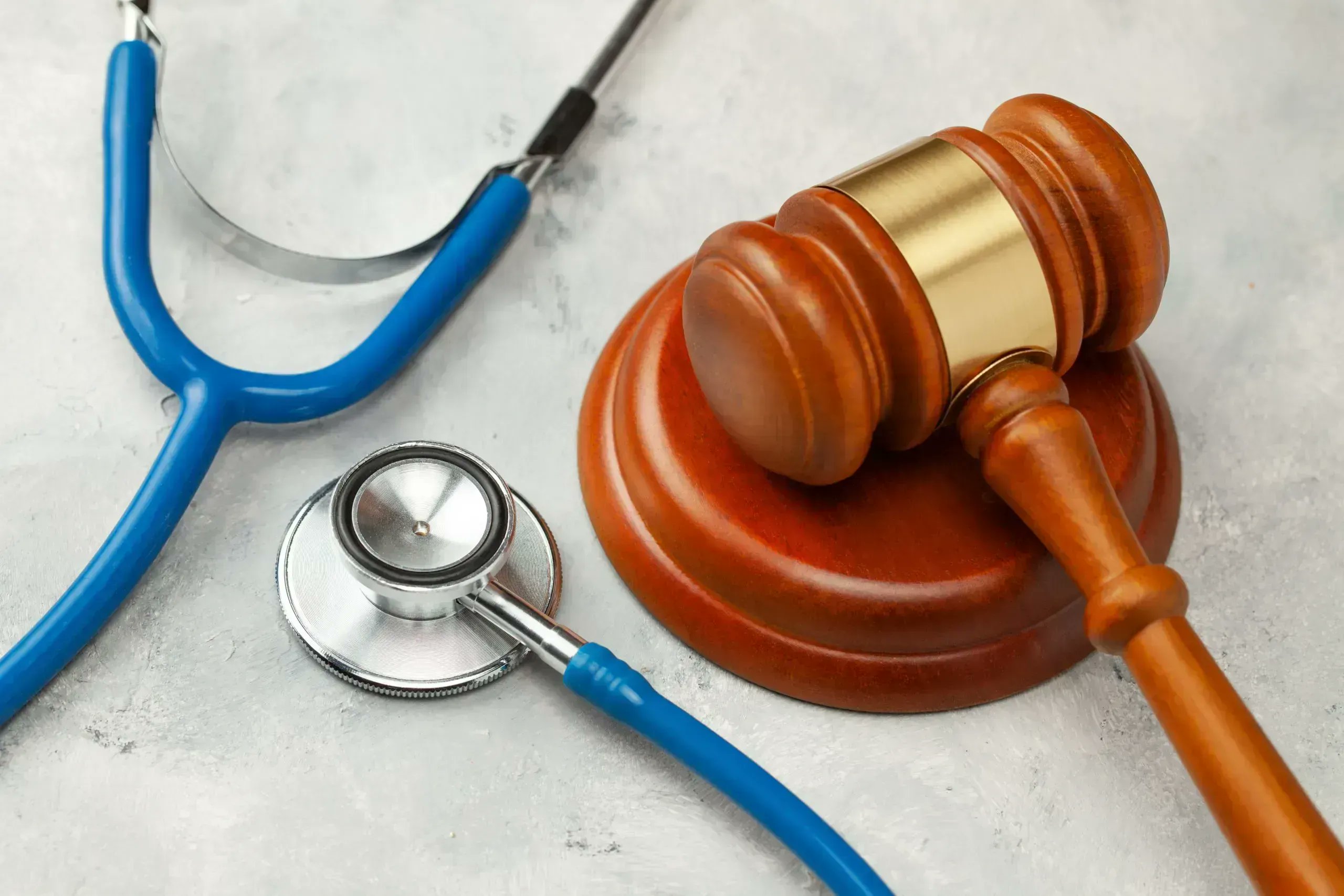
Medical Ethics and Research: Medical lawyers provide guidance on legal and ethical issues in medical research, including informed consent, protection of human subjects, and compliance with regulations governing clinical trials. It's important to note that the specific role and responsibilities of a medical lawyer may vary depending on their practice area, the jurisdiction they operate in, and the needs of their clients.
Medical negligence solicitors, also known as medical malpractice lawyers, are legal professionals who specialize in handling cases related to medical negligence or medical malpractice. They provide legal representation and advice to individuals who have suffered harm or injury due to substandard medical care or medical errors. Here are some key responsibilities and services provided by medical negligence solicitors: . Case evaluation: Medical negligence solicitors assess the details of a client's case to determine if there are grounds for a medical negligence claim. They review medical records, consult with medical experts, and analyze the circumstances surrounding the alleged negligence. Legal advice: Solicitors provide expert legal advice to clients regarding their rights, options, and the potential outcomes of pursuing a medical negligence claim. They explain the legal process and help clients understand the complexities of medical malpractice law. Gathering evidence: Medical negligence solicitors gather evidence to support their clients' claims. This may include obtaining medical records, consulting with expert witnesses, and collecting testimonies from relevant parties. Negotiation and settlement: Solicitors negotiate with the opposing party, typically the healthcare provider or their insurance company, to reach a fair settlement on behalf of their clients. They advocate for their clients' rights and strive to secure maximum compensation for the harm suffered. Court representation: If a settlement cannot be reached, medical negligence solicitors represent their clients in court. They present the case, cross-examine witnesses, and argue on behalf of their clients to establish liability and seek appropriate compensation. Compensation claims: Medical negligence solicitors help clients pursue compensation for various damages resulting from medical negligence, such as medical expenses, loss of earnings, pain and suffering, rehabilitation costs, and future care needs. When seeking a medical negligence solicitor, it's important to find one with experience and expertise in handling medical malpractice cases. They should have a strong understanding of medical procedures, standards of care, and the legal framework surrounding medical negligence claims. Note: It's always advisable to consult with a qualified legal professional or solicitor to get accurate and up-to-date information tailored to your specific situation.
A negligence lawyer, also known as a personal injury lawyer or a tort lawyer, specializes in handling cases related to negligence. Negligence occurs when someone fails to exercise reasonable care, resulting in harm or injury to another person. A negligence lawyer represents individuals who have been injured or suffered damages due to the negligent actions of others. They help their clients pursue compensation for their injuries and other losses. Here are some key responsibilities of a negligence lawyer: Case Evaluation: A negligence lawyer evaluates the circumstances surrounding the incident to determine if there is a viable case. They examine the evidence, interview witnesses, and consult with experts, if necessary, to establish the negligence of the responsible party. Legal Representation: If the negligence lawyer believes there is a valid case, they will represent the injured party in negotiations or in court. They will prepare and file the necessary legal documents, handle communication with the opposing party or their insurance company, and advocate for their client's rights. Compensation Claims: Negligence lawyers work to secure compensation for their clients, which may include medical expenses, lost wages, pain and suffering, emotional distress, and other damages resulting from the negligence. They may negotiate settlements or take the case to trial if a fair resolution cannot be reached through negotiation. Legal Strategy and Litigation: Negligence lawyers develop a legal strategy based on the specific circumstances of each case. They gather evidence, interview witnesses, consult with experts, and build a strong argument to support their client's claim. If the case goes to trial, they present the case in court and advocate for their client's interests.
5. Legal Advice and Guidance: Throughout the legal process, negligence lawyers provide advice and guidance to their clients. They explain the legal aspects of the case, outline the available options, and help clients make informed decisions about settlement offers or pursuing litigation. Proving Negligence: Negligence lawyers must establish that the defendant owed a duty of care to the plaintiff, breached that duty through negligent actions, and caused injury or harm as a direct result of that breach. They must present evidence and arguments to demonstrate the defendant's negligence. It's important to consult with a qualified negligence lawyer if you believe you have a negligence case. They can assess the details of your situation and provide guidance on how to proceed with legal action to protect your rights and seek compensation for your losses.
Clinical negligence solicitors are legal professionals who specialize in handling cases related to medical malpractice or clinical negligence. They assist individuals who have suffered harm or injury due to the negligent actions or omissions of healthcare providers, such as doctors, nurses, hospitals, or other medical professionals. The role of clinical negligence solicitors involves investigating the circumstances surrounding a client's injury or harm, gathering evidence, assessing the viability of a claim, and providing legal advice on the available options. They guide their clients through the complex legal process, including filing a claim, negotiating with insurance companies or healthcare providers, and representing them in court if necessary. Clinical negligence solicitors handle a wide range of cases, including misdiagnosis or delayed diagnosis, surgical errors, medication mistakes, birth injuries, hospital-acquired infections, negligent treatment, and inadequate informed consent. They work closely with medical experts and other professionals to build a strong case on behalf of their clients, aiming to secure compensation for their injuries, ongoing medical care, loss of earnings, and other damages. When searching for a clinical negligence solicitor, it's important to find someone with expertise in this specific area of law. Look for solicitors who are experienced in medical negligence cases, have a track record of successful outcomes, and are members of relevant professional bodies or organizations, such as the Law Society or the Association of Personal Injury Lawyers (APIL). It's also beneficial to seek initial consultations with different solicitors to discuss the details of your case, understand their approach, and assess their communication and fee structures. Many clinical negligence solicitors offer a free initial consultation or a no-win-no-fee arrangement, where you only pay their fees if your case is successful. Please note that while I strive to provide accurate and up-to-date information, it's always recommended to consult with a qualified legal professional or conduct your own research for specific legal advice or to find a clinical negligence solicitor.
A medical injury lawyer, also known as a medical malpractice lawyer, is a legal professional who specializes in handling cases related to injuries or harm caused by medical negligence or medical errors. These lawyers are well-versed in the complex laws and regulations governing the medical field and have expertise in pursuing legal claims on behalf of individuals who have suffered harm due to medical mistakes. Here are some key aspects of what a medical injury lawyer typically does: Case Evaluation: A medical injury lawyer will assess the facts and circumstances surrounding a client's case to determine if there are grounds for a medical malpractice claim. They will review medical records, consult with medical experts, and analyze the events leading to the injury. Legal Representation: If the lawyer determines that a valid case exists, they will represent the injured individual in all legal proceedings. This includes negotiating with insurance companies, filing lawsuits, and advocating for the client's rights and interests. Building the Case: The lawyer will gather evidence, such as medical records, expert testimonies, and other relevant documents, to build a strong case. They may also consult with medical experts to establish the standard of care that should have been provided and demonstrate how the healthcare professional's negligence caused the injury. Settlement Negotiation: Many medical injury cases are resolved through settlement negotiations. The lawyer will engage in discussions with the opposing party or their insurance representatives to seek a fair settlement that compensates the injured individual for their damages, including medical expenses, lost wages, pain, and suffering. Trial Representation: In situations where a fair settlement cannot be reached, the lawyer will proceed to trial, presenting the case before a judge and jury. They will prepare legal arguments, examine witnesses, and present evidence to establish liability and seek compensation for their client. Expert Network: Medical injury lawyers often work closely with a network of medical experts, including physicians, surgeons, and specialists, who can provide professional opinions and testimony to support the client's case. It's important to note that the specific tasks and responsibilities of a medical injury lawyer can vary depending on the jurisdiction and the complexities of the case. If you believe you have been a victim of medical malpractice, it is advisable to consult with an experienced medical injury lawyer who can provide guidance based on the laws and regulations applicable in your area.
A hospital lawyer is an attorney who specializes in healthcare law and represents hospitals and healthcare facilities in legal matters. Hospital lawyers are responsible for advising hospital administrators and medical staff on a variety of legal issues, including compliance with regulations, medical malpractice claims, patient privacy, and employment law.
Hospital lawyers work closely with hospital management and medical staff to develop policies and procedures that comply with state and federal laws, and they may also represent the hospital in court or in negotiations with insurance companies or government agencies.In addition to their legal expertise, hospital lawyers must also have a good understanding of healthcare practices and policies, as well as the medical issues that may arise in the course of treating patients. They must be able to analyze complex medical records and understand the nuances of medical procedures and terminology.Overall, hospital lawyers play an important role in helping hospitals and healthcare facilities navigate the complex legal landscape of healthcare, and ensure that they are providing safe, effective, and legal care to their patients.
Lawyer malpractice in medical cases, also known as legal malpractice, occurs when an attorney handling a medical case fails to provide the client with competent and diligent legal representation, resulting in harm or damages to the client. Examples of medical cases where lawyer malpractice may occur include medical malpractice claims, medical device or drug litigation, and health insurance disputes. The lawyer may have committed malpractice by, for example, missing important deadlines, failing to properly investigate the case, or providing incorrect legal advice.


If you believe that you have been a victim of lawyer malpractice in a medical case, you may be able to pursue a legal malpractice claim against the attorney. To do so, you will typically need to show that the attorney breached the duty of care owed to you, that this breach caused you harm, and that you suffered damages as a result.It is important to consult with a qualified attorney who specializes in legal malpractice cases to understand your legal options and to determine whether you have a valid claim.
If you're looking for medical negligence lawyers on the Gold Coast in Australia, there are several reputable law firms that specialize in medical malpractice cases.
Carter Capner, located in brisbane, has a dedicated medical negligence division that focuses on helping victims of medical malpractice. They have a strong track record of successfully representing clients in medical negligence claims. It's important to research each law firm, review their experience and track record, and consider scheduling a consultation to discuss your specific case. Keep in mind that this information is based on the knowledge available up to September 2021, so it's always a good idea to verify the details and availability with the law firms directly.
if you believe you have a legal case against a hospital, it may be in your best interest to seek the advice of a licensed attorney in your jurisdiction who can evaluate your situation and provide guidance on the best course of action. They can help you understand your legal rights and options and assist you in navigating the legal system to pursue any potential claims you may have against the hospital.
Negligence lawyers are legal professionals who specialize in cases where a person has suffered harm or injury due to the negligence of another party. Negligence is a legal term that refers to a failure to exercise reasonable care, which can result in harm or injury to another person. Negligence lawyers help individuals who have been injured due to the negligence of others to obtain compensation for their damages.
Negligence lawyers typically handle cases related to personal injury, medical malpractice, product liability, premises liability, and other types of negligence claims. They help their clients to investigate the circumstances surrounding their injury, gather evidence to support their claim, and negotiate with insurance companies and other parties to obtain a fair settlement.

If you believe that you have been injured due to the negligence of another party, you may wish to consult with a negligence lawyer. They can evaluate your case and help you understand your legal rights and options for seeking compensation for your damages.
Medical misdiagnosis is when a healthcare provider makes an incorrect diagnosis of a medical condition or disease. This can happen for a variety of reasons, such as a lack of information, misinterpretation of symptoms, or miscommunication between healthcare providers and patients.
Medical misdiagnosis can have serious consequences for patients, including delayed or incorrect treatment, unnecessary procedures, and even harm or death in some cases. It is important for healthcare providers to take the time to carefully consider all available information when making a diagnosis, and to communicate clearly with patients about their diagnosis and treatment options.
Patients who are concerned that they may have been misdiagnosed should speak with their healthcare provider to discuss their concerns and to seek a second opinion if necessary. It is important to be proactive in seeking the right diagnosis and treatment, as this can have a significant impact on a patient's health and well-being.
Medical claims solicitors are legal professionals who specialize in helping clients who have suffered harm or injury as a result of medical negligence or malpractice. They work to help their clients obtain compensation for their losses, which may include medical expenses, lost wages, pain and suffering, and other damages.
Medical claims solicitors are knowledgeable about medical law and the legal system, and they work to help their clients navigate the complex process of filing a medical negligence claim. They may also work with medical experts and other professionals to build a strong case for their clients.